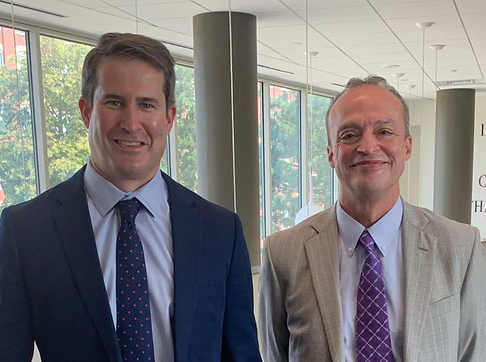September 23

Congressman Seth Moulton and President William Heineman
Congressman Seth Moulton is pleased to announce that North Shore Community College (NSCC) will receive a U.S. Department of Health and Human Services grant of $810,000 over four years to fund training for behavioral health paraprofessionals in partnership with regional employers.
NSCC will collaborate with community stakeholders including schools, nonprofit organizations and mental health providers to increase the number of behavioral health paraprofessionals and peer support specialists in the regional workforce.
The $130,361 first year of funding will provide tuition, fees & stipend incentives for students to gain access to post-secondary education and enter these fields, as well as help bolster the much-needed workforce in these areas. Program participants will work with Agency Support Mentors who will provide support and guidance throughout the training program which also includes field placements and coursework in substance and opioid use disorder (SUD/OUD) treatment and prevention.
Rep Moulton said: “One of my top priorities in Congress is expanding access to mental and behavioral health care and ending the stigma around it, but none of this is possible if we don’t have more Americans going into these careers. That’s why I’m so proud to secure over $800,000 to NSCC for training behavioral health paraprofessionals. I can’t wait to meet the students!”
Objectives of the program include: reducing student financial barriers in order to increase the number of workers specializing in behavioral health; enhancing human services training pathways with substance use disorders (SUD) coursework; expanding training and experiential field opportunities for paraprofessionals who target children, adolescents, transitional age youth, and the disabled; and creating a multi-tiered educational pathway that allows students to earn certificate and/or associate degree credentials with additional opportunity to transfer AS credits to a four-year institution.
NSCC’s primary service area has both significant opioid and substance abuse issues, and high need/high demand for workers trained in behavioral health and areas impacting behavioral health, such as developmental disabilities and SUD. To address these needs under an innovative common core care model, NSCC will enhance its existing Human Services Certificate programs to incorporate specialized credit-based coursework in SUD and Addiction, while also providing a stackable credential that leads to an associate degree (AS), resulting in a more diversified and better trained human service workforce capable of addressing the needs of individuals suffering from more than one disorder or comorbidity.
The project will increase the number of program completers, improve the quality of the behavioral health workforce; address the needs of children, adolescents and transitional aged youth in high need/high demand areas at risk for behavioral health disorders; expand and improve access to quality treatment; and foster an integrated approach to address behavioral prevention and treatment, including developmental disabilities and substance use disorders.
“This funding is critical as it will ease the tuition burden on students, improve educational access, and contribute to the workforce expansion of educated human services workers that are needed to serve our community,” said NSCC President Dr. William Heineman. “We know from our students that they are excited to have more training and this opportunity to earn the stackable credentials that this grant is targeting.”
The project will launch this month led by Erinn Gilmore, Ed.S., program chair for NSCC’s Developmental Disabilities certificate and associate degree program.
This is NSCC's third Health Resources and Services Administration (HRSA) Award. HRSA is an agency of the US Health and Human Services which focuses on healthcare workforce development and improving healthcare delivery. NSCC also has an Opioid Workforce Expansion Program grant and an Opioid Impacted Family Support Program. Both train paraprofessionals to work with individuals and families impacted by substance use disorder (SUD). These programs provide tuition assistance, apprenticeship and stipends to support certificate and degree attainment in these Human Services pathways.

